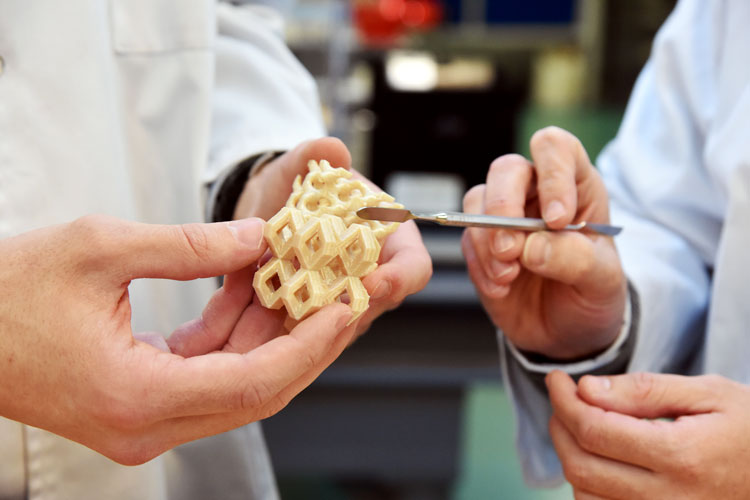Within the “Sustainable, intelligent, and connected and integrated transport” project of the State Program of R+D+i, the 3DPC project of IQS School of Engineering works to obtain future, light and bio-inspired structures, to face with guarantees the environmental challenges and structural weight reduction of vehicles and aircraft.

Image of one of the 3D structures developed (image provided by AIQS)
Reducing the weight of transport vehicles has proven to be a highly efficient way of improving their efficiency, resulting in reduced fuel consumption and the corresponding atmospheric emissions. Sandwich-structured composite materials are a highly competitive solution that have been adopted and consolidated in the automobile industry.
A sandwich-structured composite consists of joining two thin, rigid and resistant pieces separated by a lightweight and relatively thick core. This material layout allows manufacturers to create extremely light panels and structural elements, with excellent rigidity, flexural strength, and structural performance. Therefore, the use of this solution allows manufacturers to face any challenge with certainty, revealing an enormous potential for the solution to be applied in different sectors such as aeronautics, wind power, shipbuilding, automotive industry, and transport in general.
3 Dimensional Printed Cores (3DPC)
The 3Dimensional Printed Cores (3DPC) at the IQS School of Engineering aims to contribute to the development of sandwich structures with sheets of composite materials and cores manufactured using additive manufacturing technology.
3DPC aims to delve into the design, manufacturing, simulation and analysis of honeycomb lattice panel cores and bioinspired three-dimensional cores, using different geometries and cell layouts which, together with the carbon fibre skins, will form a high-performance hybrid sandwich structure.
With all this, the researchers at IQS are trying to demonstrate the viability of additive manufacturing technology, and in particular the Fused Deposition Modelling (FDM) technique, for the manufacturing of sandwich panel cores, thus providing new levels of freedom in the design of light structures and components in combination with advanced composite materials.
Societal Challenges Programme
The 3DPC Project at the IQS School of Engineering has been included within the State R+D+I Programme Oriented to Social Challenges from the State Scientific and Technical Research and Innovation Plan 2017-2020, granted by the State Research Agency. The plan consists of 8 main challenges, with the 3DPC project included in the fourth challenge, which refers to "Sustainable, intelligent, connected and integrated Transport".











